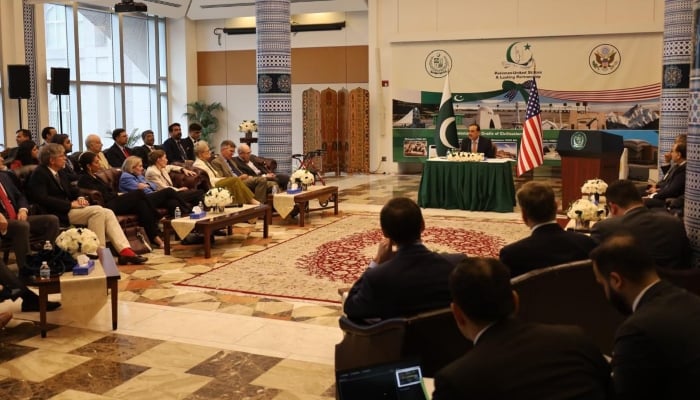
RAWALPINDI: Field Marshal Syed Asim Munir has reiterated that Pakistan continues to play a responsible and proactive part in reducing regional tensions and advancing cooperative security frameworks in the face of the rising Middle East tensions, a statement issued by the Inter-Services Public Relations (ISPR) said on Friday.
The military’s media wing said the chief of army staff (COAS) also provided a detailed account of Pakistan’s balanced approach to regional and global conflicts, advocating for dialogue, diplomacy, and adherence to international law.
During his official visit to the United States, COAS Munir remarked this while holding a comprehensive and candid exchange with senior scholars, analysts, policy experts, and representatives of leading international media outlets in Washington DC.
The interaction with prominent US think tanks and representatives of the strategic affairs institutions, provided an opportunity to articulate Pakistan’s principled stance on key regional and global issues, and to deepen understanding of the country’s strategic outlook.
The army chief is on a week-long visit to the US, which has come in the backdrop of heightened tension in the Middle East involving an ongoing war between Israel and Iran triggered by the former’s attack on Tehran and followed by the latter’s retaliation.
Field Marshal Munir’s visit also holds significance in the context of the Trump administration’s role in brokering a ceasefire between Islamabad and New Delhi following last month’s armed clashes that broke out following the Pahalgam attack in Indian Illegally Occupied Jammu and Kashmir — which New Delhi blamed on Islamabad without offering any evidence.
The 87-hour-long conflict last month between the two nuclear-armed neighbours — which included cross-border strikes by both countries — left 40 civilians and 13 armed forces personnel martyred in Pakistan.
Pakistan had launched Operation Bunyan-um-Marsoos after downing six Indian Air Force jets, including three Rafales in response to Indian aggression.
After days of cross-border strikes, the war between the two nuclear-armed nations ended on May 10 with a ceasefire agreement brokered by the US.
Besides brokering the ceasefire, Trump has also offered to mediate the longstanding Kashmir dispute between Pakistan and India.
Since the US-brokered ceasefire — where President Trump played a key role, both Islamabad and New Delhi have undertaken a diplomatic outreach initiative globally to present their respective stance on the recent clashes between the arch-rivals.
Meanwhile, in his remarks, the chief of army staff highlighted Pakistan’s unwavering commitment to regional peace and stability, and its constructive role in fostering a rules-based international order.
The field marshal eluded to the details and analysis of the Maarka-e-Haq, Operation Bunyan-um-Marsoos, and elaborated on Pakistan’s perspective on terrorism, saying that the malign influence of certain regional actors in sponsoring and perpetuating terrorism as a tool of hybrid warfare.
He emphasised that Pakistan has been on the front lines of the global war against terrorism, having rendered immense sacrifices — both human and economic — in pursuit of a safer and more secure world.
Field Marshal Munir shed light on Pakistan’s remarkable untapped potential, particularly in the domains of information technology, and agriculture, and its vast and underexploited reserves in the mining and mineral sectors. He invited international partners to explore collaborative opportunities in these sectors to unlock shared prosperity.
The discussion further included an evaluation of the long-standing Pakistan-US partnership. The COAS underlined the historical convergences between the two nations, particularly in areas such as counter-terrorism, regional security, and economic development. He underscored the immense potential for a broader, multidimensional relationship built upon mutual respect, shared strategic interests, and economic interdependence.
Participants noted the openness and clarity of the COAS’s perspectives and appreciated Pakistan’s consistent and principled policies. The interaction was marked by a spirit of mutual understanding and was widely regarded as a positive step toward enhancing strategic dialogue between Pakistan and the United States.
This engagement reflects Pakistan’s commitment to transparent diplomacy, international engagement, and the pursuit of peaceful coexistence through principled and proactive dialogue.







